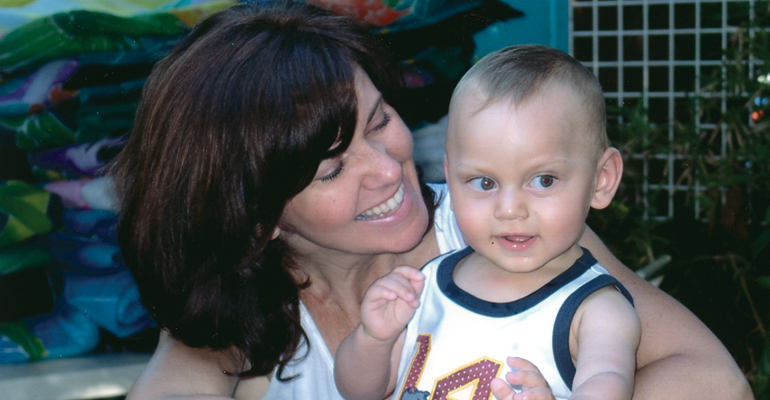When it became obvious that I was never going to get pregnant, I figured that I had dodged a bullet. Like many women approaching 40, I knew, when I boarded the infertility roller coaster, that the chances of a pregnancy were slim. But I wanted to try, if only to avoid future regrets. After all, if the treatments didn’t work, my husband and I would retire early and travel more.
And so, as my doctor broke the news to me after each failed IVF, I felt a kind of relief. I even wore workout clothes to the final procedure, planning to go straight to the gym, and afterward, to indulge in all the other pleasures I’d denied myself during treatment…wine, sushi, chocolate, sex.
Sometimes I felt guilty. I knew women who were devastated by infertility. I thought I was being supportive when I pointed out how great their lives were — terrific husbands, beautiful homes, great friends. And I was equally fortunate. I could hardly complain about my inability to conceive.
My husband just nodded his head when I got on my soapbox. I’m sure he saw it as my way of dealing with the disappointment. It wasn’t until the fifth (and final) IVF that he told me how much having a child meant to him.
We had discussed adoption in the past, but Eric hadn’t wanted to open our lives to scrutiny. So, at the gym, after the last doctor’s visit, I programmed the treadmill and began planning our future. If we saved our money, we could both retire by 55 and buy a little place on the beach, which would serve as home base when we weren’t traveling the world.
Later, as I laid out my grand plans, my husband gently interrupted me and said he’d been reconsidering adoption. “WHAT???” Nothing could have surprised me more.
Plan B
Pondering this plot twist, I rethought adoption as well. If we got a healthy, older kid, not a newborn, we would know that there weren’t any defects. Harsh, maybe, but my husband’s brother was born with difficulties that will keep him in a group home for the rest of his life. The truth was that I didn’t want a child badly enough to take on a child with disabilities.
Reluctant but game to learn more, I joined my husband in a meeting with an adoption attorney recommended by several friends. The meeting is a blur now, but the conclusion was that we would stock up on diapers. Having been told that the process could take anywhere from nine months to two years, we went home to create a photo collage, write a heartwarming letter to potential birth mothers, and wait.
It was only days before I received a call at my office. A birth mother was ready to talk to me. She proved not to be the one, but by the time the next call came, I had my sea legs. I began the conversation by asking her if she agreed that this was a little weird. Ice broken, we got to know each other, and, although I knew she had other couples to consider, I felt hopeful. I let myself think about being a mom.
After we had a few more conversations, she called one day while I was out. There was no official, momentous pronouncement. She was just wondering what we needed to do next. I grilled my husband — what did she mean? Were we the ones?
Our attorney confirmed that we were. I felt relieved, fearful, and, surprisingly, joyous at what lay ahead. In the astonishing months that followed, I took her to doctors’ appointments and coached her through labor. I was the first one to hold the baby she’d been carrying. My new son began cooing to me, and, instinctively, I replied in kind. Many mothers had tried to convince me that my lack of interest in babies would change. “It’s different when they’re yours.” I always nodded, but never believed them. My apologies to them all.
Isn’t it Ironic?
Although my husband and I had agreed to take turns getting up with baby Jack, I found myself bounding out of bed to beat him to the bassinet. At the office I spent the day waiting for the time when I could leave work and rush home. I even considered faking an illness to get out of the evening at the Emmy Awards, usually a highlight of my professional life.
I was out of control, and loving every minute of it.
Then, six months into parenthood, as we watched our son — and our love for him — grow by leaps and bounds, life handed us a script change. During a checkup, our pediatrician noticed that Jack’s eyes weren’t tracking normally. Tests showed that our beautiful boy has a rare and potentially serious condition called optic nerve hypoplasia (ONH), which can reduce vision or, in the extreme, cause blindness, hormone deficiencies, and decreased motor skills.
Rather than feeling burdened, I saw that everything made sense. The pre-eminent medical specialist for ONH is based near us. Had our son stayed with his birth mother, he may never have received the diagnosis and treatment he needs.
We won’t know the extent of Jack’s vision problem until he’s older. We do know that his motor development is a bit delayed. But for now, things are going well. I often say that Jack’s a typical Hollywood type, with three therapists and meetings all day long.
As hard as I tried to avoid having a child with “special needs,” I’m a better parent because of it. I am determined to give as much joy to my boy as he’s given to us.



